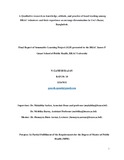| dc.contributor.advisor | Sarker, Malabika | |
| dc.contributor.advisor | Barua, Mrittika | |
| dc.contributor.author | Rajan, N Ganesh | |
| dc.date.accessioned | 2023-07-13T10:26:48Z | |
| dc.date.available | 2023-07-13T10:26:48Z | |
| dc.date.copyright | 2023 | |
| dc.date.issued | 2023 | |
| dc.identifier.other | ID 22167031 | |
| dc.identifier.uri | http://hdl.handle.net/10361/18823 | |
| dc.description | This project report is submitted in partial fulfillment of the requirements for the degree of Master of Public Health (MPH), 2023. | en_US |
| dc.description | Cataloged from the PDF version of the project report. | |
| dc.description | Includes bibliographical references (pages 20-22). | |
| dc.description.abstract | Introduction:
Covid-19 Volunteers played a vital role in absorbing the shock on the healthcare system to some
extent during the pandemic by task shifting. They played a multifaceted role where healthcare
students assisted in medical activities, and non-medical volunteers helped with surveillance,
quarantine, providing psychological support, and preventive measure campaigns. On contrary,
disseminating healthcare knowledge by a non-medical person to the community in this infodemic
scenario is challenging. The practice of handwashing is considered to be one of the best ways to
prevent covid-19 infection. The current study focused on knowledge, attitude, and practice of
handwashing among BRAC volunteer and their experience in message dissemination and
implementation of handwashing stations.
Method: This study was conducted in the Sadar and Ramu Upazila of cox’s Bazar of Bangladesh.
We used an exploratory qualitative study to conduct this research and purposive sampling was
done to select the volunteer. 8 in-depth interview was conducted using semi-structured in-depth
interview guidelines.
Findings: we found that volunteers were from different educational backgrounds and ages but
they have good knowledge about covid-19 and handwashing. Induction training post-recruitment
helped to attain this uniform knowledge among them. All-volunteer believed that covid-19 can
be controlled by embracing proper covid-19 preventive measures, and handwashing. Various
factors like financial allowance, security, power play, misconceptions, power play, inadequate
logistical supply, and the design of the handwashing station acted as barriers and the BRAC
brand, support from the local government and religious leader, and response from the community
were the facilitator’s factors for message dissemination.
Conclusion: From this study, we can say that volunteers have the proper knowledge to
disseminate correct information to the community. During emergency periods volunteers can be
trained to perform appropriate tasks. So as to absorb the shocks in the health system. In addition,
involving key community stockholders in planning can make the message context-specific and
easy to implement. Lately providing a human-centric designed handwashing station can promote
hand washing in the community. | en_US |
| dc.description.statementofresponsibility | N Ganesh Rajan | |
| dc.format.extent | 30 pages | |
| dc.language.iso | en | en_US |
| dc.publisher | Brac University | en_US |
| dc.rights | Brac University project reports are protected by copyright. They may be viewed from this source for any purpose, but reproduction or distribution in any format is prohibited without written permission. | |
| dc.subject | Covid-19 | en_US |
| dc.subject | Knowledge, Attitude and Practice (KAP) | en_US |
| dc.subject | BRAC volunteers | en_US |
| dc.subject | Cox’s Bazar | en_US |
| dc.subject | Hand washing | en_US |
| dc.subject.lcsh | Health and hygine | |
| dc.title | A qualitative research on knowledge, attitude, and practice of hand washing among BRAC volunteers and their experience on message dissemination in Cox’s Bazar, Bangladesh | en_US |
| dc.type | Project report | en_US |
| dc.contributor.department | James P Grant School of Public Health, Brac University | |
| dc.description.degree | M. Public Health | |

